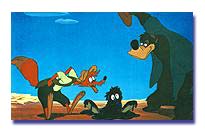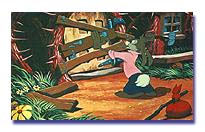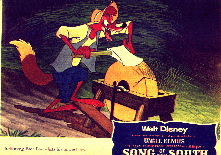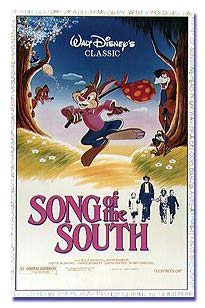

 Directed
by: Harve Foster & Wilfred Jackson
Directed
by: Harve Foster & Wilfred Jackson
Written by: Dalton S. Reymond from the
book by Joel Chandler Harris
Music by: Daniele Amfitheatrof, Foster
Carling, Ray Gilbert & Allie Wrubel
Released on: 2 November 1946
Running Time: 94 minutes
Budget: $
Box-Office: $29.3 million in the U.S.
(from rentals only)
Uncle Remus/Br'er Fox... James Baskett
Br'er Bear... Nick Stewart
 Br'er
Rabbit... Johnny Lee
Br'er
Rabbit... Johnny Lee
Sally... Ruth Warrick
Johnny... Bobby Driscoll
Ginny... Luana Patten
Grandmother... Lucile Watson
Aunt Tempy... Hattie McDaniel
John... Erik Rolf
Toby... Glenn Leedy
Mrs. Favers... Mary Field
Maid... Anita Brown
One of the Favers Boys... Georgie Nokes
One of the Favers Boys... Gene Holland
 |
 |
 |
A boy learns about life through the stories of Uncle Remus, which are
shown in animated segments. Little Johnny is taken to his grandmother's
plantation where he meets Uncle Remus and is guided by his stories ("Running
Away," "The Tar Baby," and "The Laughing Place") about Brer Rabbit, Brer
Fox, and Brer Bear. Johnny finds friendship with a local girl, Ginny Favers,
but is bullied by her cruel brothers. When he is accidentally gored by
a bull, it takes more than Uncle Remus to save him. His parents must reunite,
creating a happy family once more.
![]() Nick Stewart, the voice
of Brer Bear in this 1946 movie, was a popular radio guest performer
throughout the 1940s. Beginning in 1989, Stewart reprised the role for
the Splash Mountain attractions at Walt Disney World and Disneyland Park.
He died at the age of 90 on December 22, 2000.
Nick Stewart, the voice
of Brer Bear in this 1946 movie, was a popular radio guest performer
throughout the 1940s. Beginning in 1989, Stewart reprised the role for
the Splash Mountain attractions at Walt Disney World and Disneyland Park.
He died at the age of 90 on December 22, 2000.
![]() James Baskett initially
auditioned for a small voice part in the film. He not only got the part
of Br'er Fox, but also Uncle Remus, making him the first live-action actor
to be hired by Disney.
James Baskett initially
auditioned for a small voice part in the film. He not only got the part
of Br'er Fox, but also Uncle Remus, making him the first live-action actor
to be hired by Disney.
 |
 |
![]() Song of the South
was based on the "Uncle Remus" stories of Joel Chandler Harris. Harris,
who had grown up in Georgia during the Civil War, spent a lifetime compiling
and publishing the tales told to him by former slaves. These stories -many
of which Harris learned from an old Black man he called "Uncle George"-
were first published as columns in The Atlanta Constitution and
were later syndicated nationwide and published in book form. Harris's Uncle
Remus was a fictitious old slave and philosopher who told entertaining
fables about Br'er Rabbit and other woodland creatures in a Southern Black
dialect.
Song of the South
was based on the "Uncle Remus" stories of Joel Chandler Harris. Harris,
who had grown up in Georgia during the Civil War, spent a lifetime compiling
and publishing the tales told to him by former slaves. These stories -many
of which Harris learned from an old Black man he called "Uncle George"-
were first published as columns in The Atlanta Constitution and
were later syndicated nationwide and published in book form. Harris's Uncle
Remus was a fictitious old slave and philosopher who told entertaining
fables about Br'er Rabbit and other woodland creatures in a Southern Black
dialect.
![]() Walt Disney said
at the time of the film's release that "the first books I ever read were
the Uncle Remus stories. Ever since then,
these stories have been my special favorites. I've just been waiting until
I could develop the proper medium to bring them to the screen."
Walt Disney said
at the time of the film's release that "the first books I ever read were
the Uncle Remus stories. Ever since then,
these stories have been my special favorites. I've just been waiting until
I could develop the proper medium to bring them to the screen."

![]() Song of the South consists of animated sequences featuring Uncle Remus
characters such as Br'er Rabbit, Br'er Fox, and Br'er Bear, framed by live-action
portions in which Uncle Remus (portrayed by actor James Baskett, who won
a special Oscar for his efforts) tells the stories to a little white boy
upset over his parents' impending divorce. Although some Blacks have always
been uneasy about the minstrel tradition of the Uncle Remus stories, the
major objections to Song of the South had to do with the live action
portions. The film has been criticized both for "making slavery appear
pleasant" and "pretending slavery didn't exist", even though the film (like
Harris' original collection of stories) is set after the Civil War and
the abolition of slavery.
Song of the South consists of animated sequences featuring Uncle Remus
characters such as Br'er Rabbit, Br'er Fox, and Br'er Bear, framed by live-action
portions in which Uncle Remus (portrayed by actor James Baskett, who won
a special Oscar for his efforts) tells the stories to a little white boy
upset over his parents' impending divorce. Although some Blacks have always
been uneasy about the minstrel tradition of the Uncle Remus stories, the
major objections to Song of the South had to do with the live action
portions. The film has been criticized both for "making slavery appear
pleasant" and "pretending slavery didn't exist", even though the film (like
Harris' original collection of stories) is set after the Civil War and
the abolition of slavery.
![]() Song of the South
was nominated for Best Score at the 1948 Academy Awards, and won 2 statuettes:
Best Song for "Zip-A-Dee-Doo-Dah", and an Honorary Award for James Baskett,
"for his able and heart-warming characterization of Uncle Remus, friend
and story teller to the children of the world, in Walt Disney's Song
of the South".
Song of the South
was nominated for Best Score at the 1948 Academy Awards, and won 2 statuettes:
Best Song for "Zip-A-Dee-Doo-Dah", and an Honorary Award for James Baskett,
"for his able and heart-warming characterization of Uncle Remus, friend
and story teller to the children of the world, in Walt Disney's Song
of the South".
![]() The 1946 Academy Award-winning
feature has not been seen in American theaters since 1986, and remains
the one Disney classic that has yet to be released in this country on home
video. In a May 2003 statement, Buena Vista Home Entertainment stated that
"Walt Disney Home Entertainment uses many factors to evaluate which movies
in its rich library will be issued onto video and DVD formats To this point,
we have not discounted nor committed to any distribution window concerning
this title."
The 1946 Academy Award-winning
feature has not been seen in American theaters since 1986, and remains
the one Disney classic that has yet to be released in this country on home
video. In a May 2003 statement, Buena Vista Home Entertainment stated that
"Walt Disney Home Entertainment uses many factors to evaluate which movies
in its rich library will be issued onto video and DVD formats To this point,
we have not discounted nor committed to any distribution window concerning
this title."
![]() Because of its extensive
African-American stereotypes, this film is unofficially disowned by the
Disney company. Additionally, a rumor has it that the Mouse House is considering
destroying the movie because it contains the word 'nigger in it'--which
seems unlikely, since it would prove as simple relooping that word as it
was altering Pecos Bill rolling a cigarette... An owner of the 1990 British
VHS release further kills the rumor: "I own this film, have watched it
umpteen dozen times, and it certainly doesn't contain the word 'nigger'."
Because of its extensive
African-American stereotypes, this film is unofficially disowned by the
Disney company. Additionally, a rumor has it that the Mouse House is considering
destroying the movie because it contains the word 'nigger in it'--which
seems unlikely, since it would prove as simple relooping that word as it
was altering Pecos Bill rolling a cigarette... An owner of the 1990 British
VHS release further kills the rumor: "I own this film, have watched it
umpteen dozen times, and it certainly doesn't contain the word 'nigger'."
![]() Perhaps lost in all
the controversy over the film is the fact that James Baskett, a Black man,
was the very first live actor ever hired by Disney. Allegedly, though,
Baskett was unable to attend the film's premiere in Atlanta because no
hotel would give him a room.
Perhaps lost in all
the controversy over the film is the fact that James Baskett, a Black man,
was the very first live actor ever hired by Disney. Allegedly, though,
Baskett was unable to attend the film's premiere in Atlanta because no
hotel would give him a room.
![]() Film historian Leonard
Maltin told the Los Angeles Times that "I'm very fond of the movie. I think
it has been unfairly maligned and misread. [Some] people reject the film
out of hand, and I think that's a shame. It denies people of all colors
the ability to see this warm and uplifting movie. What I take away from
the movie is that Uncle Remus is a warm, good-hearted character who captures
the imagination of a lonely little boy who happens to be white. The boy
is absolutely colorblind, and the audience relates to him. There is an
incredible moment when Uncle Remus takes the boy's hand in his, and there
is an insert of the white and black hands clasped together. It's the emotional
climax of the movie. I hope it has a chance to come out again and find
a new audience. It would have to be done responsibly. I hope it comes to
pass."
Film historian Leonard
Maltin told the Los Angeles Times that "I'm very fond of the movie. I think
it has been unfairly maligned and misread. [Some] people reject the film
out of hand, and I think that's a shame. It denies people of all colors
the ability to see this warm and uplifting movie. What I take away from
the movie is that Uncle Remus is a warm, good-hearted character who captures
the imagination of a lonely little boy who happens to be white. The boy
is absolutely colorblind, and the audience relates to him. There is an
incredible moment when Uncle Remus takes the boy's hand in his, and there
is an insert of the white and black hands clasped together. It's the emotional
climax of the movie. I hope it has a chance to come out again and find
a new audience. It would have to be done responsibly. I hope it comes to
pass."
![]() Ruth Warrick, who played
Sally in the film, said in a May 2003 interview at age 86: "I wish Walt
were alive. I think I could talk him into releasing it. I'm sad [it has
not been released] because it leaves out a whole chapter in the history
of Walt Disney. The film is probably one of his crowning points." A labor
of love, Song of the South was conceived by Disney as a celebration
of Joel Chandler Harris' "Uncle Remus" stories that inspired him and enchanted
his children. "It was a film he really wanted to do," recalled Diane Disney
Miller, his daughter. "My dad quoted so much from Uncle Remus' logic and
philosophy." For more on the film, check out SongOfTheSouth.net
or Uncle Remus Pages.
Ruth Warrick, who played
Sally in the film, said in a May 2003 interview at age 86: "I wish Walt
were alive. I think I could talk him into releasing it. I'm sad [it has
not been released] because it leaves out a whole chapter in the history
of Walt Disney. The film is probably one of his crowning points." A labor
of love, Song of the South was conceived by Disney as a celebration
of Joel Chandler Harris' "Uncle Remus" stories that inspired him and enchanted
his children. "It was a film he really wanted to do," recalled Diane Disney
Miller, his daughter. "My dad quoted so much from Uncle Remus' logic and
philosophy." For more on the film, check out SongOfTheSouth.net
or Uncle Remus Pages.

![]() The film and its songs provided the inspiration for the Splash Mountain
attractions in the Disney Theme Parks. Bobby Driscoll and Luana Patten
were Disney's first contract players, since this was the Studio's first
major plunge into live-action filmmaking. But since Walt Disney was considered
an animation film producer, it was felt that the film should contain at
least some animated sequences. Thus, Uncle Remus's stories are shown in
animation, along with some clever combinations of the live-action and animated
characters.
The film and its songs provided the inspiration for the Splash Mountain
attractions in the Disney Theme Parks. Bobby Driscoll and Luana Patten
were Disney's first contract players, since this was the Studio's first
major plunge into live-action filmmaking. But since Walt Disney was considered
an animation film producer, it was felt that the film should contain at
least some animated sequences. Thus, Uncle Remus's stories are shown in
animation, along with some clever combinations of the live-action and animated
characters.
From a January 2003 column at Jim Hill Media.
Given that Buena Vista Home Entertainment is really beginning to scrape the bottom of the barrel when it comes to the Disney film vault (Coming soon from BVHE to a retailer near you: The Don Knotts Collection. As if there are really people out there who are truly desperate to add the DVDs of Gus and The Apple Dumpling Gang Rides Again to their collection), I know that they'd really love to put a title like Song of the South out there in the marketplace. A movie that Disneyana fans and animation buffs have been begging for for years now. A title that would be sure to sell 10-12 million units easy.
But--that said--seriously wonder if Disney will ever dare to put Song of the South out on home video and DVD in Region 1 (i.e. the United States and Canada). I mean, if the former head of Disney Feature Animation Thomas Schumacher is to be believed, SOTS is now supposedly on permanent moratorium.
And what exactly is "permanent moratorium?" Is it the Disney-esque equivalent of Dean Wormer's infamous "Double Secret Probation?" Actually, what "permanent moratorium" supposedly means (in this case, anyway) is that the Walt Disney Company has no intentions to ever put Song of the South back into theatrical release here in the U.S. Nor does the corporation have any plans to release this live action / animated feature in the home video or DVD format here in North America.
Which is unfortunate. Not to mention hypocritical. After all, Disney's Song of the South has been readily available for purchase in the Orient for years now. (Why else do you think that all those video versions of Song of the South that sell on eBay have Japanese subtitles? That's because they're direct dubs off of the SOTS laser disc.)
Why exactly would Disney make Song of the South available for sale in Asia but not in North America? Basically BVHE's international arm believes that there aren't many African-Americans there who would complain about the film's portrayal of blacks.
Which is kind of a two faced policy, don't you think? That Disney pretends to care about the feelings of its black customers here in North America ... then abandons that pretense in the Orient.
But this sadly has become standard operating procedure with the modern Walt Disney Company: to give the impression that the company actually cares about something, rather than actually caring.
This actually reminds me of the last time that Walt Disney Studios put Song of the South out in theaters here in the U.S. That was back in 1986. Just two years after Michael Eisner took control of the Mouse House.
If the Walt Disney Company is really so concerned about the feelings of African Americans, then why did the studio put this allegedly offensive film back into theaters?
Well, actually there's kind of an interesting story associated with that particular re-release of Song of the South. You see, Tony Baxter and the Imagineers who were working on "Zip-a-Dee-Doo-Dah River Run" (a new flume ride that was being proposed for construction at Disneyland in the late 1980s) were leaning heavily on Eisner to allow them to use the characters and settings from Song of the South to help theme this attraction.
And Uncle Michael actually liked the idea of adding a flume ride to Disneyland. It's just that Disney's CEO was somewhat squeamish about the attraction's proposed subject matter. Eisner was worried that a ride that was built around Uncle Remus might unintentionally offend African-Americans. Which might result in Disneyland being picketed by the NAACP.
Still the Imagineers persisted, insisting that this proposed Disneyland flume ride wouldn't work unless they were allowed to build "Zip-a-Dee-Doo-Dah River Run"'s storyline around the Song of the South characters and settings.
This is why -- as sort of a litmus test for this attraction -- Eisner ordered that "Song of the South" be put into an extremely limited release in the Fall of 1986. If I'm remembering correctly, the film was only out in theaters for two weeks. Three weeks max. Before "SOTS" was quickly pulled and put back in the vault.
Given that no one wrote to the Walt Disney Company while Song of the South was playing in theaters here in the U.S. to complain about the film's portrayal of its black characters (and--more importantly--given that SOTS actually did pretty well at the box office during its limited re-release), Eisner finally gave the Imagineers the okay to use the movie's characters and settings in their proposed Disneyland flume attraction.
However, just to play it safe, Uncle Michael ordered that all references to Uncle Remus be removed from the ride; that's why the narrator in the queue area is clearly identified as Brer Frog. Eisner also asked that--to further distance this thrill ride from the somewhat controversial Song of the South--that WDI drop the name "Zip-a-Dee-Doo-Dah River Run" in favor of something a bit more generic. Which is how Disneyland's flume ride ended up being called "Splash Mountain."
Anyway... Rick, you asked me if Disney has any plans to release Song of the South on home video and DVD. Well, given this "permanent moratorium" nonsense, the Mouse is now insisting that this particular film will never ever see the light of day again... at least here in the United States.
Which is really interesting. Given that--as recently as three years ago--Buena Vista Home Entertainment was actively exploring ways they could release SOTS on home video and DVD here in the U.S.
Of course, in order to make this title palatable to the general public during these increasingly politically correct times, BVHE knew that it had to package this film just right. Which is why (for a time) Disney toyed with the idea of selling a version of Song of the South that would have been preceded by a showing of Walt Disney Feature Animation's new short, John Henry.
You see, Buena Vista Home Entertainment's idea was to persuade a prominent African-American like James Earl Jones, Morgan Freeman or Dr. Maya Angelou to serve as the MC on this DVD / home video. Someone who could introduce Song of the South, explaining the film's historical significance as well as re-enforcing the idea that SOTS was a product of a less enlightened time in Hollywood.
Then--once Song of the South finished being shown--the film's host would then introduce John Henry. Which (hopefully) would demonstrate the great strides that the Walt Disney Company had made in its depiction of and attitudes toward African-Americans.
It seemed like a pretty fool-proof scheme. Using the device of a prominent African-American narrator to help put Song of the South in proper perspective. A framework which would (hopefully) make SOTS more palatable (or--at the very least--less distasteful to) African American consumers.
The only problem was... Buena Vista Home Entertainment reportedly approached the wrong African American first. The way I keep hearing this story, the very first person that BVHE went to in their quest to recruit a narrator / host for their Song of the South / John Henry home video and DVD project was poet Maya Angelou. Angelou supposedly loved "John Henry" when WDFA screened the short for her, but was deeply offended by SOTS. The noted author then allegedly told the reps at Buena Vista Home Entertainment that--if they ever dared to put "Song of the South" up for sale in the United States--that she personally would take part in the protests.
That threat was reportedly enough for the Walt Disney Company to order Song of the South back into the vault... never to see the light of day again.
And that framing device that Buena Vista Home Entertainment dreamed up for its proposed Song of the South / John Henry combo release? That concept actually ended up being used on BVHE's American Legends release. That home video and DVD (which was released back in 2001) featured James Earl Jones as its host/narrator. In which the noted African American actor introduced John Henry, Johnny Appleseed, Paul Bunyan and Casey Jones, The Brave Engineer.
Still--as Buena Vista Home Entertainment struggles to find other older Disney film titles to put up for sale on home video and DVD--you have to wonder if the temptation to release Song of the South will eventually become too great. That--even with the outcry from African-Americans that is almost certain to accompany the re-release of this film--that this still could end up being a profitable venture for the Mouse. That-- f BVHE were eventually able to move 10-12 million units of SOTS--that all of the agita and anxiety associated with this movie's home video and DVD release would ultimately be worth it.
My advice, Ryan? Keep an eye on Buena Vista Home Entertainment. If this division of the Walt Disney Company's upcoming releases--Treasure Planet, Atlantis II: Milo's Return, and the colorized version of The Absent Minded Professor--don't exactly set the retail world on fire, BVHE execs may feel that they have no choice but to revisit the company's decision to put SOTS on permanent moratorium.
After all, this was the corporation that said that Disneyland's "Main
Street Electric Parade" was "... glowing away forever." So--if that parade
can come back to Anaheim--chances are pretty good that Song of the South
won't actually be stuck in Disney's film vaults forever.
|
||||||||||||